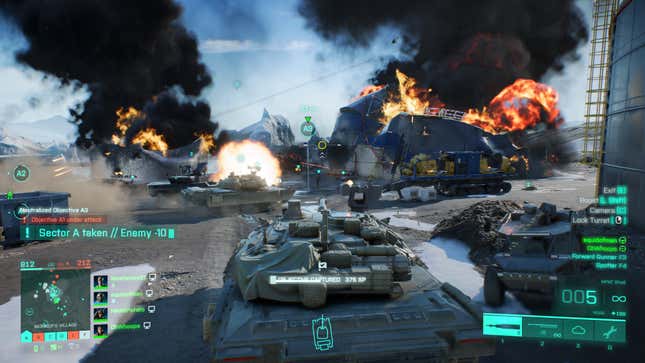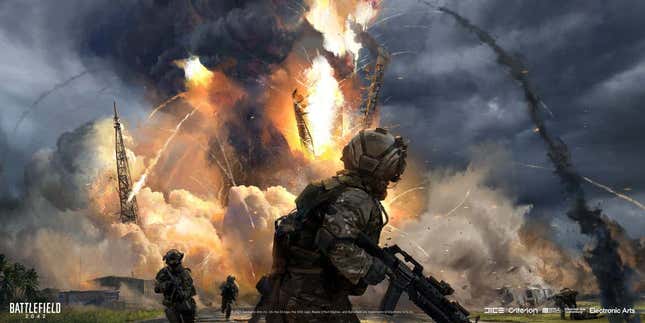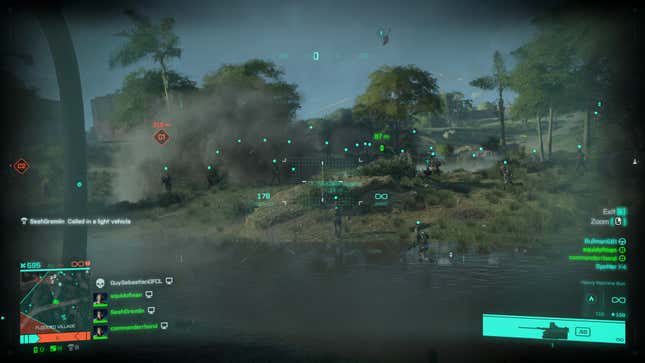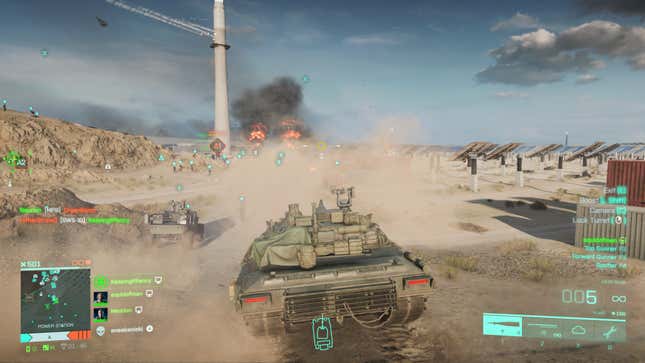So, Battlefield 2042, huh. People sure have opinions about Battlefield 2042. In fact you could drive a main battle tank through the divide between a lot of the critical and popular reaction to DICE’s latest, the first modern (or in this case near-modern) Battlefield since 2013's Battlefield 4.
A lot of professional reviews say it’s fine. Good, even. That it has some issues, sure, but that at its heart it’s big and fun like all good Battlefield games should be. A lot of upset fans, however, hate it. Can’t stand it. They say it’s broken, that it’s half a game, that it’s the worst Battlefield game ever made.
This discrepancy has kept me fascinated for the last few weeks as I’ve played my own way through the game, like an exhausted soldier wading through the game’s rising sea levels. For most of that time the in-game chat has been almost exclusively about how **** the game is (a bot automatically censors naughty words), how unbalanced it is, how nobody wants to be playing it, yet nearly every time I fired it up I was...enjoying myself?
Something was up, so after I decided I was going to review this game, I decided I was also going to wait a few weeks and see how 2042's launch madness settled down, let me play it after a couple of updates had been downloaded, and see how everyone was doing after Battlefield fans had a chance to see the game for what it was, not what they wanted it to be.

What I’ve found is a game where both sides can be right. There is a very fun and explosive video game here, one that doesn’t just continue Battlefield’s unique multiplayer legacy but expands on it in ways we could only have dreamed of a decade ago. Yet this is also half a video game, with a laundry list of things that feel either broken, missing or empty, as though EA had run a beta then charged everyone full price for...another beta.
The first thing that strikes you about Battlefield 2042 is that, if you’ve played any game in the series over the last decade, you’ll immediately notice the things you think are missing, not the things that are there. It’s very easy to look at the last few Battlefield games and see what they offered and what’s not in Battlefield 2042—as this exhaustive, widely-shared compendium has—and assume those things have all been simply withheld.
Like when you’re first dumped onto the game’s sparse main menu screen and it’s clear there’s no specific singleplayer, which is a huge bummer considering the work that went into crafting this near-future, not-quite-dystopian world. Indeed it’s clear there’s not much going on at all, with less game modes to choose from and a clear emphasis on just a couple of those that are present.
Get into a game and that sense of loss continues. Maps are bigger but also empty in large parts, resulting in long slogs for infantry specialists. There are less weapons to use. The class system (as it exists in relation to players fulfilling specific roles like medic and engineer) is gone. Factions are all but gone. There are no leaderboards, no scoreboards, no way to track your K:D ratio or see at the end of a game who got the most headshots.
Like most other players jumping in for the first time, and whose last experience with a Battlefield game had been with one that had been polished, updated and expanded for years, all I could see were the holes. The gaps where features and choices used to be. And it sucked.

That’s how I spent my first week playing, anyway, as it felt like most experienced players did (judging by the in-game chat and general discourse, at least). We were all “playing” the game, but really what we were doing was taking notes and comparing, as though we were all playing the latest edition of FIFA or NBA 2K, annual releases where so much time is spent cataloguing what was new and what was old, what was better and what was worse than the last one you played.
As I did this, I found myself agreeing with a lot of what the masses of upset fans were saying. The whole thing did feel shallow, and meaningless. Some of the stuff that was missing removed a lot of people’s motivation to play the game, deprived them of a sense of purpose compelling them to log on every day. Basically, Battlefield 2042 was barely a coherent video game at all. It was more a collection of maps and animations and ideas stuck together with tape, with “BATTLEFIELD” slapped over the front of it all in an attempt to pass it off as something more.
At the same time, though, I kept finding myself coming back. Past the oversights, past the errors, I just kept logging on and enjoying the game in spite of it all. There was a ton of debris scattered all over this smoking crater of a launch, and I don’t begrudge anyone from surveying the scene and assuming the entire game had been completely destroyed, but picking amongst the wreckage I’d found some things I really loved as well.
What I found was that not everything was missing. There’s a difference between something that is withheld and something the game’s developers have removed with a clear design intent in mind. Turns out I love the leaderboards being gone, for example, because I never play Battlefield for K:D ratios, I play it to be part of a big battle where I’m fighting alongside and helping my teammates however I can, and the new end-of-round displays—which shout out a few key achievements, rather than meticulously listing everyone’s stats—reflect that.

I’ve come around to the idea of the game’s Specialists as well, or at least the idea of them, though even here there’s a conundrum that sums up this game’s design conflicts. They’re a difficult implementation to unpack because including them in the game meant removing the old class system; I miss the simplicity and visual identifiers traditional soldier types provided, and I hate their chirpy and repetitive one-liners, but I also really like the ability to pick a soldier and tailor them so specifically to the way I like to play the game.
Most of all, though, what keeps me coming back in spite of all these problems is the game’s scale. Battlefield 2042 may be lacking in singleplayer, and its smaller game modes are little more than a diversion (the build-your-own Portal mode has promise, but is often devoid of players, even on classic maps like Battlefield 3's Caspian Border), but this is a Battlefield game that knows more than any other that the main draw here are the big battles, and has built itself around them accordingly.
By doubling the playercount in its tentpole Conquest and Breakthrough modes, from 64 players to 128 (on PC and next-gen at least, PS4 and Xbox One are capped at 64), this is Battlefield at its loudest, largest and most chaotic. And I don’t know about you, but those are exactly the things that get me playing these games in the first place.
If you’re playing Conquest, that most traditional of Battlefield experiences where two teams fight over a bunch of flags, you’ll notice that you’re now actually fighting over clusters of flags, on maps so big that you can spend most of them engrossed in just one part of them, your actions just one part of a story playing out across multiple objectives.
Switch to Breakthrough, though, the mode that just throws two teams against one another across a map-wide frontline, and you’ll come the closest this series has ever come to feeling like you’re fighting a war. While the mode itself is not new to this game, the experience of fighting alongside 63 other humans across a line in the map, explosions and tracers and vehicle fire erupting all around you, is bigger and grander here than ever. Cresting a hill to see dozens of colleagues rushing a control point, choppers crashing and tanks firing off rounds all around you, is simply incredible.

It’s here, in these moments of cinematic bombast, that I’m most comfortable calling this a very good video game. When it becomes clear that many of the changes made to this game aren’t omissions, but rather changes made to accommodate this new and bigger focus. Of course it’s boring for infantry to walk around, the maps needed to be big enough for 128 players, that’s why you can almost always summon a car to get around in. Leaderboards are nice but how useful can they be when 128 players are involved, and many of them have dropped in or out of the game during its 45-minute duration? Taking a step back and seeing what Battlefield 2042's focus is, instead of holding it up against different and older games, makes determining some of what it is (and isn’t) a little clearer, a little easier to take.
Then a round ends, and everyone gets dumped back into an anonymous lobby system, all new sides are picked and we’re sent right back into it all over again, and I start to understand once more why so many longtime fans, those who spend hours a day playing their way up the ranks, aren’t as big a fan of this as I am.
The word “unfinished” gets thrown around a lot these days, often simply to refer to a game that is lacking in a bit of polish, or is missing a feature or two that fans wanted. But Battlefield 2042 truly feels unfinished, as though every menu screen and transition to a new map is a placeholder for something more final yet to come.
The process from picking a game mode to actually beginning gameplay is full of unexplained cutscenes and bizarrely half-completed animation sequences, and when fans say the game is lacking factions, what they mean is the game doesn’t really have them at all, with every vehicle across both the US and Russia’s arsenal the same (in some cases identical in functionality if not appearance, in most cases simply identical) and both sides populated with the same roster of Specialists.
The entire game’s framework is scaffolding around an unfinished building, and even a month after release, you can still see builders and electricians and tilers scrambling all over the site. Since launch a number of changes have been made to the game, and more still are coming. A lot of vital in-game information like damage counters and crew numbers have been added, wonky bullet spray has been fixed, frustrating checkpoints removed and overall the whole game now, even just a few weeks after release, is playing better and telling the player more stuff they need to know than it did at launch, when everyone was so upset with it.
They haven’t magically fixed everything everyone was complaining about, but it’s progress. We could and should have seen all this coming, of course. Every Battlefield game launches like this, and then gets years of patches and updates to refine the experience. Every time someone complains about how they spent 1000 hours on Battlefield 4 and won’t be coming back to Battlefield 2042, based only off their first week’s play, I think of stuff like this, and how time is a flat circle:

But then this time also feels different. The problems aren’t just bugs or netcode or servers. Not everything wrong with this game can be plastered over with updates and patches. There’s an inescapable sensation here that whether cuts were made to it, its direction changed halfway through development or if it was simply too hard to make a Battlefield game in the middle of a pandemic (or all three!), many of the problems plaguing Battlefield 2042 are fundamental, and we’re stuck with them, whether you like them or not.
I’m used to reviewing games that are finished, that have some semblance of a clarity of purpose, because that’s the state you want to be critically assessing a game in. So looking at Battlefield 2042, even though it’s “out” and has been for a few weeks, has been tough.
Like I’ve said already, this is barely a game at all, at least in the sense we’d hope to approach such a title. It’s a collection of maps, ideas, guns, tanks and menus, all thrown into a box and a lid hastily pushed down on top of them, the only thing unifying them all being the fact they’re all in the same directory on my SSD called “Battlefield2042".
For all its loose threads and empty holes and bad ideas, though, I can’t help but still enjoy my time with this game. Like an amalgamation of the wider reception to this polarising effort, I’ve ended up frustrated at everything wrong with Battlefield 2042 while still appreciating that the one thing it had to get right—making the player feel like they’re part of a Very Big Battle—is the one thing it absolutely nailed.